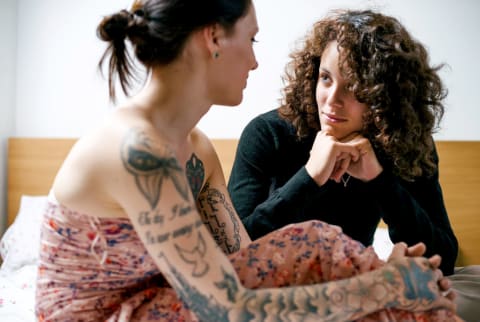Advertisement
Yes, There's A Healthy Way To Disengage From A Conflict With Your Partner


What did your parents or other caregivers do when they had conflict?
Did they fight, each arguing and hoping to win? Maybe one was angry and the other compliant. Or maybe one was angry and the other logically explaining or defending. Maybe one shut down or withdrew; maybe they both did.
We pick up so much from the way the people who raised us behaved throughout our earliest memories. What you do now when in conflict with a partner, friend, or relative likely follows the role modeling of your parents and caregivers.
My parents would briefly fight, yelling and blaming each other, and then either my father would comply—or they both withdrew. I never saw any conflict between them truly get resolved. Sometimes one or the other would explain or defend, but that led nowhere. Of course, because this is what I saw, this is what I learned to do. Just like I'd watched them do all throughout my childhood, I became addicted to trying to control the outcomes of my arguments with my husband. It took me years to figure out how to switch my intent from controlling the situation (and him) to learning and loving.
After 30 tumultuous years of marriage as well as over 50 years of working with individuals and couples, here's what I've learned about arguing in a long-term relationship:
There are really only two healthy ways of dealing with a conflict.
The first is to approach with the intent to learn. Oftentimes the way we behave in an argument is based around a desire to control the outcome—we yell or explain or defend ourselves because we want the conflict to end on our terms, or we comply to our partner simply out of a desire to keep their emotions at bay. But there is a major difference between looking for solutions simply to control someone and actually opening yourself up to learn about why they feel the way they do and why you feel the way you do. When you reframe your mindset this way, you start to see conflict not as something to win or lose but as an opportunity to learn and grow.
We each have good reasons for seeing things the way we do based on what was modeled to us growing up and how we hope this particular conflict will end. But the goal is to grow as a person and as a couple (rather than just trying to get the situation under control); you can find a way to resolve the conflict in a way where you both felt like winners. And in the process, you gain new information that inevitably leads to loving conflict resolution anyway.
Of course, this strategy only works as long as the other person is also willing to listen, be humble, and observe your emotions and viewpoint, just like you are doing for them. If one or both of you refuse to come to the table with a receptive outlook, you won't get anywhere with finding a solution.
One of the most difficult lessons I've learned, both from my practice and especially from my own marriage that eventually collapsed, is that we have no control over whether another person is open or closed. No matter how much you might try to go to your partner trying to show love and a willingness to understand their perspective, it takes both of you being open to learning to actually come to a resolution that feels good.
If that mutual openness is not there, there's only one other way to deal with a conflict.
If the other person isn't open to learning, then you need to lovingly disengage.
This is very different from withdrawing, which is a withholding of love and a covert form of anger meant to punish the other person.
Lovingly disengaging is what you can do to take care of yourself. It's like getting a child out of range of another person's angry or harsh energy. When you take yourself away, it's important to focus on keeping your heart open to loving yourself and loving the other person. Compassionately embrace any painful feelings and send compassion to them. Let them know that you will check in with them throughout this process to see if they are available to talk about the conflict again.
If they don't eventually open to a two-way conversation to find a mutually beneficial resolution, then you can and should do your own inner work to decide how to take loving care of yourself in this situation. Resolve the conflict for yourself, fully accepting that you have no control over your partner.
We can look at some small examples to understand how this works: If your partner is always late getting out the door with you, you can start to take your own car and agree to meet them later at the destination. If they persist in being messy, accept hiring someone to clean up the house as a perfectly reasonable and necessary solution.
Importantly, these actions shouldn't be read as passive-aggression, and you should convey that to your partner. They're simply a way for you to solve a problem on your own after attempts at regular conflict management alongside your partner have proved impossible. Let them know ahead of time what you are going to do, and regard them with love throughout this process.
Importantly, this will take practice.
Learning to let go of your control over another person is no easy task. It takes practice to let go of those old, learned, controlling behaviors and train yourself into healthier ones—but it's worth the effort. Rather than feeling upset and helpless, you will feel empowered when you open to learning or lovingly disengage. And like magic, that ability to accept your lack of control over your relationship will actually improve it in the long run.